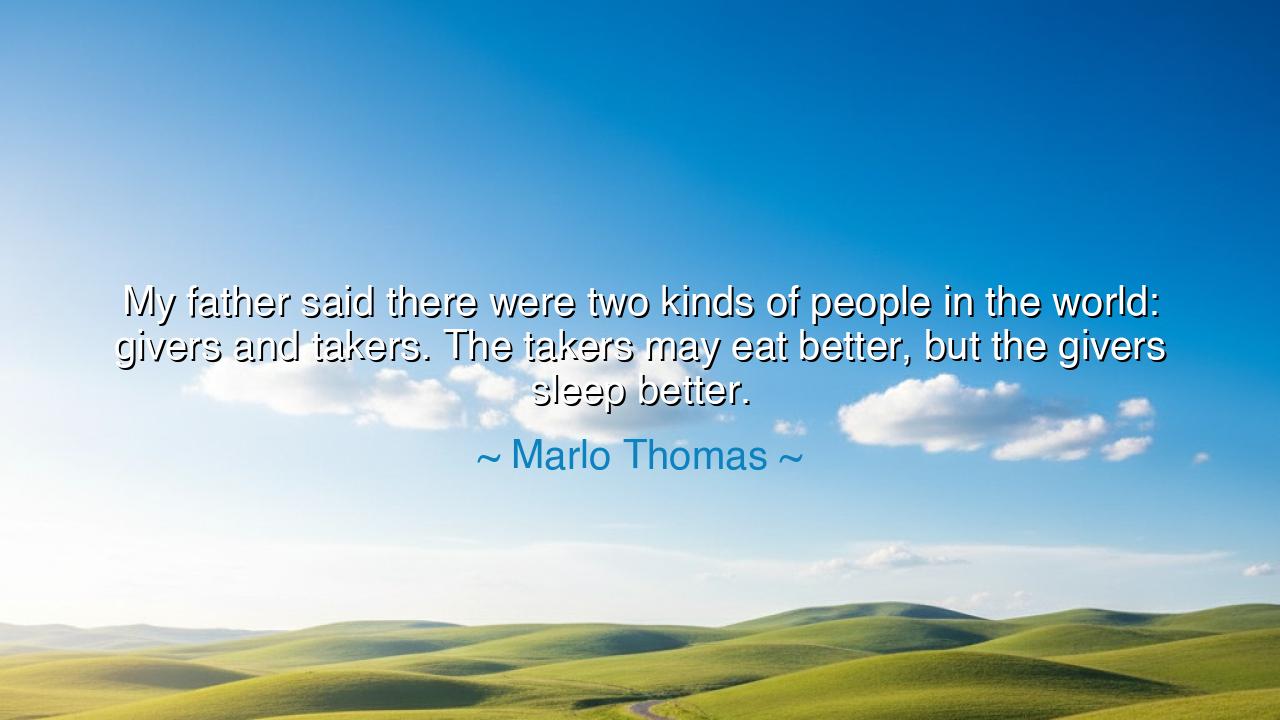
My father said there were two kinds of people in the world:
My father said there were two kinds of people in the world: givers and takers. The takers may eat better, but the givers sleep better.






The words of Marlo Thomas, “My father said there were two kinds of people in the world: givers and takers. The takers may eat better, but the givers sleep better,” illuminate one of the oldest truths of human life. There are those who live by taking, filling their tables with abundance, gathering wealth, and seeking only their own comfort. And there are those who live by giving, offering their time, their strength, their love, and even their bread to others. The one may feast, but the other knows peace. For though the taker may dine richly, the giver alone rests with an untroubled heart.
The ancients often taught this contrast. The Stoics declared that fortune’s treasures cannot buy tranquility, for the restless spirit finds no sleep, even in a golden bed. Meanwhile, the one who has lived with generosity, even in poverty, lies down in peace, his conscience unburdened. To be a giver is to be in harmony with nature’s law, which itself gives without ceasing—the sun to the earth, the rain to the fields, the tree to the hungry traveler.
History bears testimony. Consider the life of Mother Teresa, who gave herself wholly to the poor and the dying in the streets of Calcutta. She did not eat better than the wealthy, nor did she dwell in comfort. Yet her life overflowed with a peace and purpose that the richest often envy but cannot buy. In her, we see the truth of Thomas’s father’s wisdom: that sleep, the symbol of inner rest, belongs to those who live in service rather than in self.
Yet this teaching is not only for saints. In every household and every village, the division remains. The merchant who cheats his neighbor may feast on stolen profit, but in the quiet of night, fear and guilt gnaw at him. The worker who shares what little he has may go hungry, but his heart is nourished by dignity and love. Thus, the measure of life is not what one eats, but how one rests—whether the pillow bears the weight of greed or the lightness of generosity.
Let this wisdom endure: seek not the fullness of the stomach alone, but the fullness of the soul. To give is to sow seeds that blossom into peace; to take without measure is to sow thorns that pierce the spirit. And when the end comes, no feast will matter, but the peace of the giver will remain as a crown that neither hunger nor death can take away.






TGA Thai Giang
I’m wary of binaries. Real life includes matchers, strategic altruists, and situational behaviors that shift with incentives. Sometimes restraint protects long-term capacity to contribute. How do we move beyond labeling people and instead evaluate patterns: net impact, consent, sustainability, and whether support flows both ways over time? Also, some individuals rationalize self-interest quite peacefully; moral discomfort isn’t evenly distributed. I’d appreciate a nuanced typology and a few reflection prompts to help someone choose a humane stance without self-erasure.
NTNguyen Vi Nguyen Thi
There’s a class angle. People with wealth or flexible time can offer aid with minimal personal risk; those juggling bills or caregiving may pay a high price for the same gesture. How do we honor generosity without shaming those who must prioritize survival? I’d love a two-level framework: micro-acts that fit tight bandwidth, and structural asks—paid leave, predictable schedules, community childcare—that make kindness affordable. What policies actually convert private virtue into a fairer environment where more people can participate?
TNtrang nguyen
From a team perspective, how do we ensure helpful colleagues aren’t punished with constant extra work? I’m thinking visible queues for requests, a limit on simultaneous asks, scheduled “office hours” for support, and rotating on-call so favors don’t cluster around a few names. Recognition matters too: performance reviews should credit upstream assistance and process improvements, not just flashy deliverables. Could you share a lightweight policy that balances reciprocity with protection against free-riding, so supportive behavior scales instead of burning out your best people?
T1Tuan 11a2
I want to test this in real life without romanticizing it. What about a two-week experiment: week one, track ordinary days; week two, choose one deliberate act of helpfulness daily—mentoring 20 minutes, covering a shift, donating locally—then record mood, rest quality, rumination, and resentment. Add a quick reflection: Did the act cost more than it gave back? Did it strengthen a relationship? Which forms felt sustainable? I’d love a simple worksheet and failure modes, so the trial yields insight rather than guilt.
A8Huynh Vo Lan Anh 8/2
There’s an equity and boundary issue lurking here. Celebrating generosity can enable exploitation when certain people—often women or junior staff—are expected to pick up invisible labor. How do we protect helpfulness from becoming a trap? I’d want guardrails: explicit consent, time caps, rotating responsibilities, and permission to say no without reputational damage. What signals indicate a healthy culture of contribution versus a system quietly rewarding takers? I’m looking for a checklist leaders can adopt so kindness doesn’t subsidize organizational neglect.